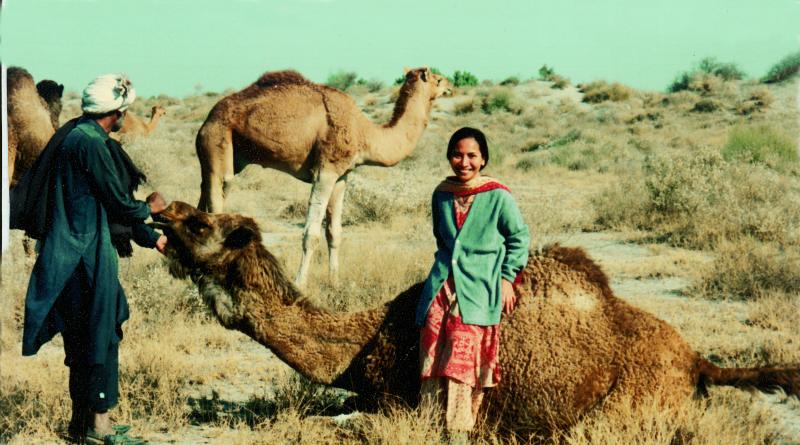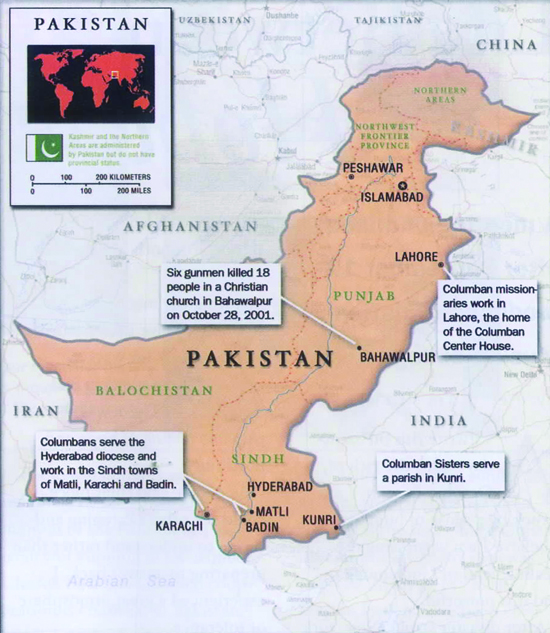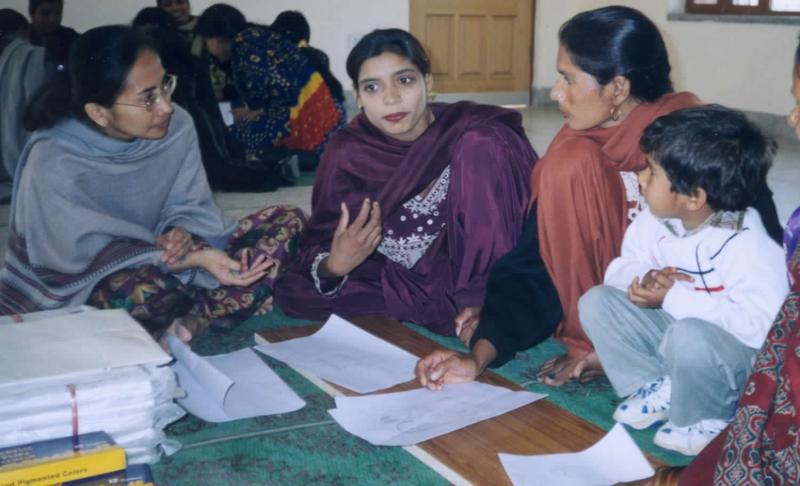Only If You Keep Believing
By Aurora Cañete Luceño

I first came to Pakistan as a Columban lay missionary in 1994 with two other women. We were the third team from the Philippines in the Columban L ay Missionary Program (CLMP) and were nicknamed ‘RP3’. Pakistan wasn’t my personal choice but when I applied I was prepared to go anywhere on mission. I lived and worked with my team during our nine months of orientation, also a time of discernment. I came to know more about myself, my faith and working with others. I opened up to a new perspective on life and the call to mission. During orientation we were made to see some of the realities, challenges and even dangers that a missionary may have to face.
Roses in December
I remember vividly the night we shared our thoughts and feelings after watching Roses in December, a documentary about Jean Donovan , an American lay missionary murdered in El Salvador on December 1980 along with three American nun , Maura Clarke MM, Ita Ford MM and Dorothy Kazel OSU. The film hit us very strongly and drew many responses from us. I stayed in the CLMP fully aware of the risks I might have to take. I continued to believe that I’m not in mission just for myself, but first and foremost to be a witness of Christ’s love to others. Being in a cross-cultural mission is incidental, I suppose. I could have been with any group in any place. But one thing I’m sure of: I’m called to be on mission as a layperson.
Through the dusty streets

At this stage I realize that no orientation program, no matter how thorough, could ever have prepared me fully for my journey of faith in this very interesting place and culture. A great part of it just had to be experienced, learned from and lived out while continuing the dusty streets of Shadbagh, which I now consider my second home. Looking back, I’m left with a heart full of appreciation and gratefulness to my family and to those who helped me in my preparation and to those who continue to support me on my journey. I’m very happy to be living and journeying with the people in this Islamic country. I continue to live among a community of families who are mostly streets sweepers and house cleaners. I’ve journeyed very closely with them, especially with the women, youth and children. We’ve worked and shared dreams together in adult literacy classes for women and for older girls, in the formation and awareness program for women in the parish, in catechesis and Sunday school for young children and in our day-to-day struggle in dealing and living with the harsh realities of poverty, discrimination, harassment, conflict and the threat of war.

My human strength
Some may not understand what makes a person leave a ‘good’ job for the missions. The lure of mission work may be a novelty at the outset but that kind of ‘high’ wears off. A noble work doesn’t always give pleasure. Often it’s tiring. There are irritations along the way from people, from circumstances, even from within. Somehow, I’ve learned to live with and work through these. At this stage, the loveand respect I share with many of the Pakistani people I’ve come to know and now call friends seem strong enough to sustain me and keep me going. Recognizing my experiences and acknowledging the value of my presence here as the only female, single, Asian lay missionary in an otherwise all-male Columban community in Pakistan, and the life –witnessing we do in the communities and the people we encounter, I’m encouraged and challenged to continue, while being fully aware of the difficulties and the dangers that we face. But I don’t think I have the makings of a saint or martyr. While I value very much the mission here and give the best that I can share in my present missionary journey, I’m a person who’s ready to say humbly, ‘I’ve enough. I can’t do it anymore’.
Is it time to go?
The aftermath of the War I Afghanistan waged by the USA and its Alllies and the threat of war between India and Pakistan saw us missionaries in a very vulnerable, volatile and highly threatened position. Even before this atmosphere of war I, as a female foreign missionary moving around the busy streets of Shadbagh, have always been in a defensive mode once I go out of the Columban house. The threat of harassment and discrimination had become a very high sensitivity and empathy for many of the Pakistani women whose experiences and realities are much worse than mine. I feel a growing interest in looking into the plight of Pakistani women and in working globally for the cause of the women. The concern and sympathy of some of my Columban companions had become a source of support and strength for me as well. In the situation of the conflict and threat of war all foreign missionaries, men and women, are very vulnerable. I found that very disturbing indeed. The attcks on Christian institutions left us sad, angry and confused. Often we asked if our continued presence in the communities was helping the people or it posed a danger to them instead. Would it be wiser for us to pack up and go? Many times we just had to stop and reflect on the changing meaning of our being here.
We will stay
I remember the Sunday I walked into the church compound after the news of two consecutive attacks on Christian institutions. I never felt so alarmed by the sight of armed soldiers commissioned by the government to guard the area and sandbags by our church gate. For the first time it dawned on me that it could be my last Eucharistic celebration with the parishioners. Day by day, we were feeling the more and more the tension and the danger, missing the little freedom and peace we used to enjoy. It was easy to be consumed by the fear and be paranoid. But we tried to hold on to our faith, go back to the reason why we were here and found great support from our families, from the Columbans, as well as from other missionaries with whom we maintain good contact and keep each other updated. We tried to be more creative in our pastoral ministry, considering the limitations we were experiencing in our movements, in how we spent our community day and recreation, and in making sufficient time to share and listen to each other. I found all of these very helpful. To top it all, the love and appreciation of many of the Pakistani we work with affirmed our decision to stay on and gave us more courage.
While on orientation in the Philippines I saw the following lines on the bulletin board in the Columban House in Singalong, Manila. I copied them on a small piece of paper that I continue to carry with me:
If you believe in something, you’ll do it because you believe in it, not continuing the results, even to the point of death.
I continue to believe in the value of the presence of the presence of the Columbans in Pakistan and the unselfish contribution of those who have been here and those who have known, worked and journeyed closely with them.